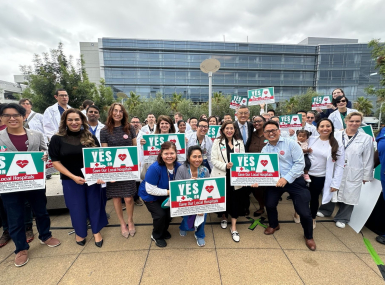Medicaid Inmate Exclusion Policy (MIEP) Advocacy Toolkit

Author

Blaire Bryant

Brett Mattson

Naomi Freel
Upcoming Events
Related News
Across America, the double standard created by the Medicaid Inmate Exclusion Policy (MIEP) is putting undue strain on our local judicial, law enforcement, public safety and human services systems. This error in legislation and federal policy results in higher rates of recidivism, increased healthcare costs and poorer health outcomes for residents. This policy drives the over-incarceration of those suffering from mental health and substance use disorders, as county jails have become the largest behavioral health facilities in the nation.
Below, find resources designed to help county officials educate Congress, the administration and the public on the importance providing access to federal health benefits for those awaiting trial and verdict decisions.
Write Your Member of Congress
Download NACo's letter template and send a letter to Congress written on county letterhead, either through the U.S. Postal Service or via email, that explains why it is critical to your county that Congress amends the Medicaid Inmate Exclusion Policy. Information on office locations and contact numbers can be found on members’ websites. Links to U.S. House of Representatives and U.S. Senate websites can be found below.
Publish a Letter to the Editor
Connect with your local media outlets to highlight the importance of Congress to amend the MIEP and the negative health and economic impact it has on counties. Write and submit op-ed columns, letters to the editor or guest commentaries to local newspapers outlining the importance of amending MIEP to your county and urging Congress to take action. Below are issue-specific talking points to consider. Remember, your ability to craft and tailor the message to fit your community is very important to publishing an op-ed. County-specific examples and other local information will significantly enhance your advocacy. NACo’s Media Relations Guide for Counties is also available to assist county officials with local media outreach.
Engage Your Members of Congress on Social Media
Demonstrate how counties are providing important health care services to justice involved individuals through pictures and stories to encourage Congress to amend the #MIEP. Most Senators and Representatives are on Twitter and monitor their Twitter feeds regularly. The easiest way to find your members of Congress is to utilize the search function on Twitter or by visiting your members’ website. In addition to reaching out to your members of Congress on Twitter, consider targeting House and Senate leadership. You can keep NACo in the loop on your social media advocacy by being sure to include both @NACoTweets and #MIEP in your tweets.
Sample Tweets
- 7.6 million individuals cycle through 3,100 local jails each year and many lose access to federal health benefits while they still await trial due to the #MIEP
- In #county jails across the country, #MIEP unfairly revokes pre-trial detainees’ federal health benefits such as Medicaid, Medicare, and the Children’s Health Insurance program
- #Counties operate 2,875 of our nation’s local jails and the federal government forces counties into undue financial and administrative burdens to cover the cost of pre-trial detainees’ loss of federal health benefits under #MIEP
- Nearly 70% of the 7.6 million individuals that cycle through local jails each year are pre-trial detainees that unfairly lose access to federal health benefits due to #MIEP
- The #MIEP causes disruptions in primary and behavioral health care access for justice-involved populations enrolled in federal health programs. This discontinuity in care contributes to detrimental health outcomes and increases rates of jail recidivism.
- Uninterrupted health care helps those who enter the criminal justice system break the cycle of recidivism exacerbated by untreated physical and mental illnesses and substance use disorders. Congress must #AmendtheMIEP
- The delays associated with reinstating suspended Medicaid coverage under #MIEP results in poorer health outcomes, increased recidivism and higher taxpayer costs to #counties
- Congress must amend Section 1905(a)(A) of the Social Security Act to allow for the continuation of federal health benefits for pre-trial detainees #MIEP
- Innocent until proven guilty. Having access to federal health benefits while awaiting trial with presumed innocence is an individual’s constitutional right #AmendtheMIEP
- Congress can help #counties break the cycle of recidivism caused by untreated mental illness and substance use disorders by amending the #MIEP to allow access to federal health benefits for those awaiting trial
- #Counties applaud the inclusion of MIEP reforms in the FY 2023 omnibus appropriations bill
- As a result of NACo's advocacy, states are now required to provide Medicaid and Children's Health Insurance Program benefits to juveniles awaiting trial and reentering their communities. Additionally, states have the option to extend these benefits to the broader pretrial population, ensuring better access to healthcare during critical periods of involvement with the justice system
Additional MIEP Resources
- State Funding for County Behavioral Health Crisis Services: Examples and Opportunities
- Understanding New Medicaid and CHIP Requirements for Youth in Detention: What Counties Need to Know
- Bridging Gaps: Collaborative Strategies for Supporting Youth Reentry Through Medicaid
- What Adult Jails Need to Know about Mandated Implementation of Medicaid for Detained Youths




